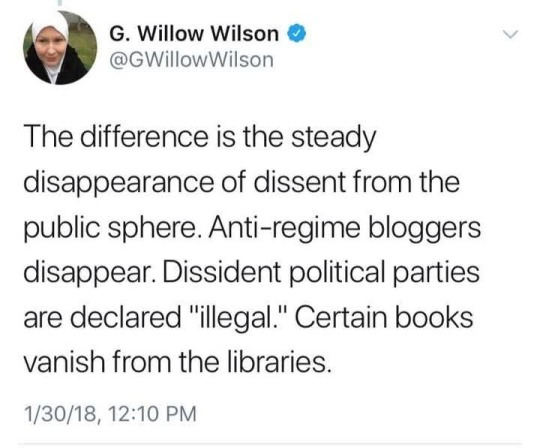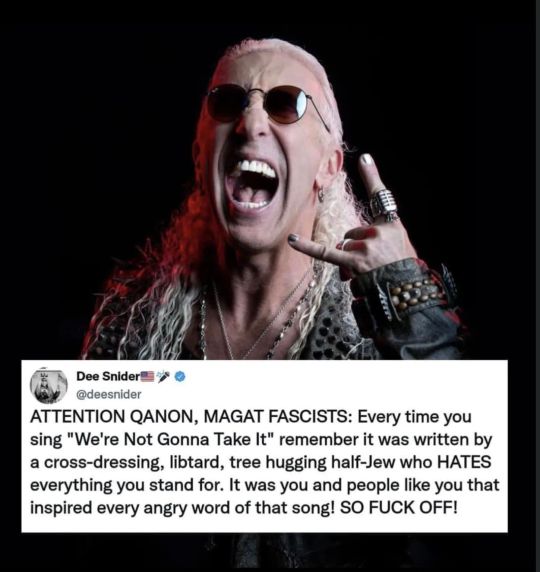Text

"This commission statement refers to people with Autism, ADHD, asthma, auto-immune disease, and chronic illness as a "dire threat to the American people and our way of life."
This is a manifesto against disability.
This is the language of eugenics."
851 notes
·
View notes
Text

Tax cuts for billionaires are the epitome of wasteful spending.
6K notes
·
View notes
Text
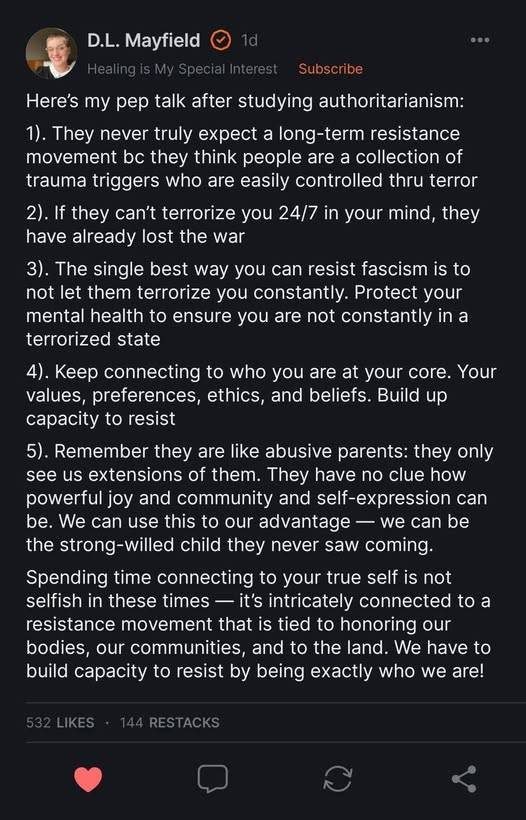
Not an invitation to cocoon yourself in a self-care bubble for four years, but a reminder to the 24/7 worriers that you can literally write "To Do on Monday: Worry about ________" on a post-it note and stop worrying about it for one day while you recharge.
20K notes
·
View notes
Text

Republicans are complicit in large part because they are cowards.
29 notes
·
View notes
Text

yesss im always saying this like sure i can give you logical advice but at the end of the day you can just do what you want to do until youre sick of it. cant move on cant switch gears til youre sick of it so go ahead and indulge
26K notes
·
View notes
Text

this is actually insane? i genuinely pray they don’t get away with it because it’s beyond messed up
2K notes
·
View notes
Text
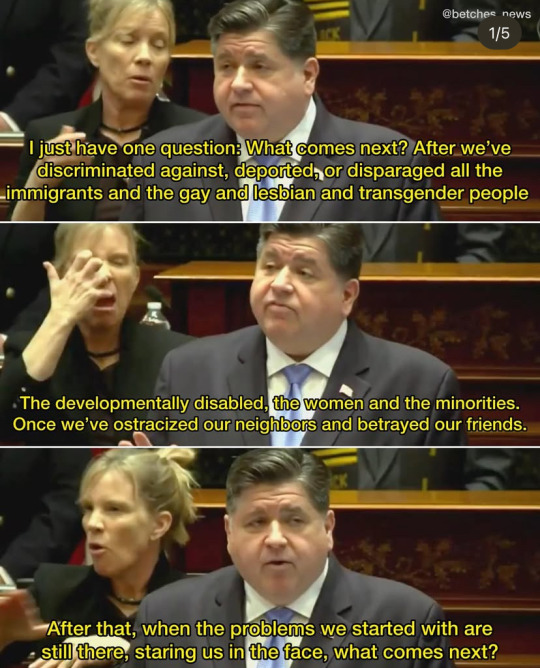
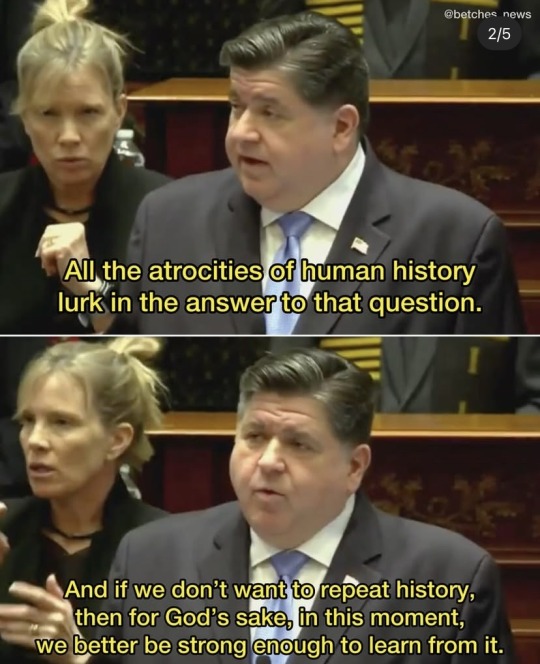
There are people – some in my own Party – who think that if you just give Donald Trump everything he wants, he’ll make an exception and spare you some of the harm. I’ll ignore the moral abdication of that position for just a second to say — almost none of those people have the experience with this President that I do. I once swallowed my pride to offer him what he values most — public praise on the Sunday news shows — in return for ventilators and N95 masks during the worst of the pandemic. We made a deal. And it turns out his promises were as broken as the BIPAP machines he sent us instead of ventilators. Going along to get along does not work – just ask the Trump-fearing red state Governors who are dealing with the same cuts that we are. I won’t be fooled twice.
I’ve been reflecting, these past four weeks, on two important parts of my life: my work helping to build the Illinois Holocaust Museum and the two times I’ve had the privilege of reciting the oath of office for Illinois Governor.
As some of you know, Skokie, Illinois once had one of the largest populations of Holocaust survivors anywhere in the world. In 1978, Nazis decided they wanted to march there.
The leaders of that march knew that the images of Swastika clad young men goose stepping down a peaceful suburban street would terrorize the local Jewish population – so many of whom had never recovered from their time in German concentration camps.
The prospect of that march sparked a legal fight that went all the way to the Supreme Court. It was a Jewish lawyer from the ACLU who argued the case for the Nazis – contending that even the most hateful of speech was protected under the first amendment.
As an American and a Jew, I find it difficult to resolve my feelings around that Supreme Court case – but I am grateful that the prospect of Nazis marching in their streets spurred the survivors and other Skokie residents to act. They joined together to form the Holocaust Memorial Foundation and built the first Illinois Holocaust Museum in a storefront in 1981 – a small but important forerunner to the one I helped build thirty years later.
I do not invoke the specter of Nazis lightly. But I know the history intimately — and have spent more time than probably anyone in this room with people who survived the Holocaust. Here’s what I’ve learned – the root that tears apart your house’s foundation begins as a seed – a seed of distrust and hate and blame.
The seed that grew into a dictatorship in Europe a lifetime ago didn’t arrive overnight. It started with everyday Germans mad about inflation and looking for someone to blame.
I’m watching with a foreboding dread what is happening in our country right now. A president who watches a plane go down in the Potomac – and suggests — without facts or findings — that a diversity hire is responsible for the crash. Or the Missouri Attorney General who just sued Starbucks – arguing that consumers pay higher prices for their coffee because the baristas are too “female” and “nonwhite.” The authoritarian playbook is laid bare here: They point to a group of people who don’t look like you and tell you to blame them for your problems.
I just have one question: What comes next? After we’ve discriminated against, deported or disparaged all the immigrants and the gay and lesbian and transgender people, the developmentally disabled, the women and the minorities – once we’ve ostracized our neighbors and betrayed our friends – After that, when the problems we started with are still there staring us in the face – what comes next.
All the atrocities of human history lurk in the answer to that question. And if we don’t want to repeat history – then for God’s sake in this moment we better be strong enough to learn from it.
I swore the following oath on Abraham Lincoln’s Bible: “I do solemnly swear that I will support the constitution of the United States, and the constitution of the state of Illinois, and that I will faithfully discharge the duties of the office of Governor .... according to the best of my ability.
My oath is to the Constitution of our state and of our country. We don’t have kings in America – and I don’t intend to bend the knee to one. I am not speaking up in service to my ambitions — but in deference to my obligations.
If you think I’m overreacting and sounding the alarm too soon, consider this:
It took the Nazis one month, three weeks, two days, eight hours and 40 minutes to dismantle a constitutional republic. All I’m saying is when the five-alarm fire starts to burn, every good person better be ready to man a post with a bucket of water if you want to stop it from raging out of control.
Those Illinois Nazis did end up holding their march in 1978 – just not in Skokie. After all the blowback from the case, they decided to march in Chicago instead. Only twenty of them showed up. But 2000 people came to counter protest. The Chicago Tribune reported that day that the “rally sputtered to an unspectacular end after ten minutes.” It was Illinoisans who smothered those embers before they could burn into a flame.
Tyranny requires your fear and your silence and your compliance. Democracy requires your courage. So gather your justice and humanity, Illinois, and do not let the “tragic spirit of despair” overcome us when our country needs us the most.
Sources:
• NBC Chicago & J.B. Pritzker, Democratic governor of Illinois, State of the State address 2025: Watch speech here | Full text
• Betches News on Instagram (screencaps)
79K notes
·
View notes
Text
In ~these times~ it is important for queer people to be reminded of what "coming out" originally meant. "Coming out" did not mean telling all of your co-workers something super stigmatized and vulnerable about you, wearing your queer status on your sleeve in public, informing the police or government institutions about your sexuality, or even telling your parents. "Coming out" meant venturing out into the queer community; being among other queers as a queer yourself.
Coming out isn't about telling the entire world when doing so is not safe for you, it's not about arming your enemies with information they could use against you. No, coming out is about making a fulfilling queer life possible for yourself through participation in the queer community. It is about escaping the restrictions and dangers of the cisgender heterosexual world by rooting oneself more deeply into the queer one.
And you can always do that. No matter how oppressed we are. No matter how much the culture shifts and policies are enacted to terrorize us. We are always able to be ourselves when we are amongst each other. And living our queerness has always been a collective social project, not just a matter of personal exposure.
16K notes
·
View notes
Text
“AFAB/AMAB language has no actual impact on your daily life, it’s an internet argument. why do you care so much?”
i went to a new doctor a little while ago, and they looked up PMDD as it’s not a diagnosis they were familiar with. IAPMD’s website referred to it as a “condition affecting people who were AFAB,” so the doctor tried to remove it from my record because according to her research it “didn’t apply to me.”
bioessentialist phrases becoming hyper-normalised, especially in medical spaces like has recently been happening, has an incredibly large impact on intersex people
2K notes
·
View notes
Text
STEAM and TEAMS!
“the arts and sciences are completely separate fields that should be pitted against each other” the overlap of the arts and sciences make up our entire perceivable reality they r fucking on the couch
137K notes
·
View notes







